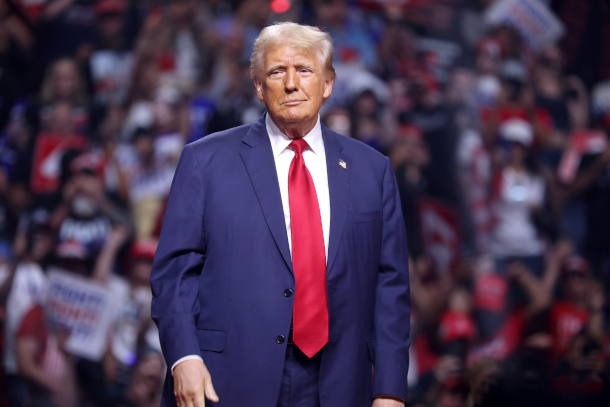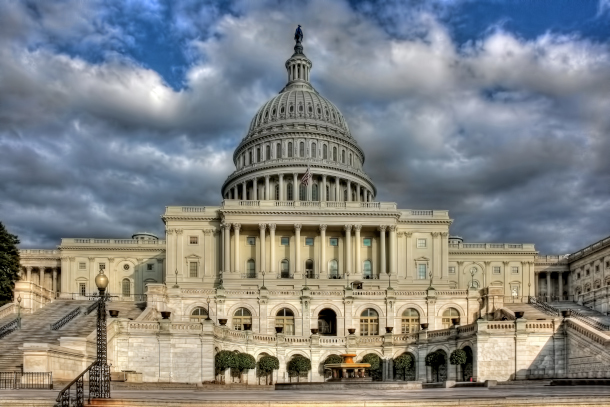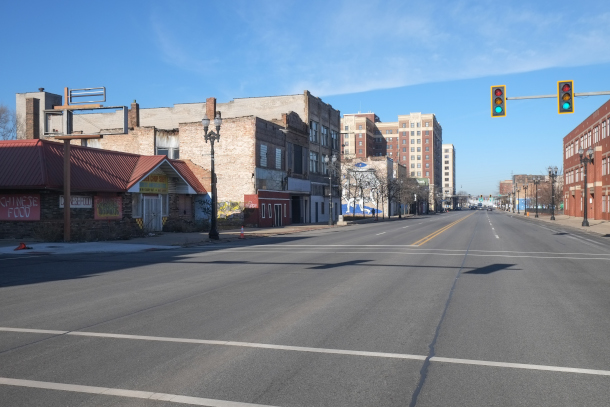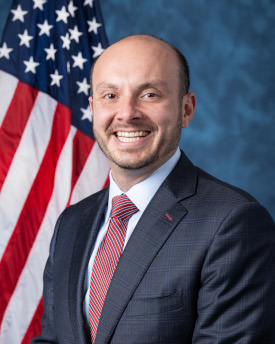Biden Climate Cash in Jeopardy
Air Date: Week of November 22, 2024

President-elect Trump has expressed interest in pulling back the Inflation Reduction Act. (Photo: Gage Skidmore, Flickr, CC BY-SA 2.0)
Given President-elect Trump’s vow to dismantle the Inflation Reduction Act, some communities are concerned about their applications for climate and environmental justice funding. Jillian Blanchard of Lawyers for Good Government talks with Living on Earth’s Aynsley O’Neill about what’s on the line and why bipartisan support for the IRA may help preserve some federal support.
Transcript
CURWOOD: It’s Living on Earth, I’m Steve Curwood
DOERING: And I’m Jenni Doering.
The 2022 Inflation Reduction Act has already doled out over $60 billion dollars in grants for thousands of climate projects across the country. And that doesn’t include even larger amounts of federal support in the form of loan guarantees and generous tax credits. Many of the projects funded by the IRA are focused on environmental justice communities that are disproportionately burdened by climate impacts. But President-elect Trump has vowed to dismantle the IRA and as the Biden-Harris Administration winds down, some communities are concerned about the fate of their climate funding. Jillian Blanchard is Director of the Climate Change and Environmental Justice Program at Lawyers for Good Government, and she offered her assessment of the situation to our colleague Aynsley O’Neill.
O'NEILL: So through the Inflation Reduction Act, the Biden administration rolled out a lot of money for domestic clean energy production and also for environmental justice communities. And from what I understand, you've been working with many of the communities that have received funding, you know, from day one. So please paint a picture for us. What do some of these environmental justice projects look like on the ground? You know, what kind of impacts are they having in their community?
BLANCHARD: Absolutely, yeah. We are working with cities and communities across the country and across the political spectrum to take advantage of the Inflation Reduction Act. And in fact, ironically, many of the benefits are going into red states. In fact, a majority of the funding under the Inflation Reduction Act, through tax credits as well as through grant programs, are going into red communities in red states. One example is some funding that will be going both through solar for all, as well as the tax credits under the Inflation Reduction Act into a micro grid project in Gary, Indiana that will benefit hundreds of thousands of underserved people on the ground in a very, very red state. In addition, we're working with a community in Toledo, Ohio, to build an eco village that will benefit underserved communities. It will also take advantage of tax credits that are available for EV infrastructure and solar. It will provide climate resilience hubs for the community to be able to go to in the event of a power outage. These are significant benefits and projects that are only made possible because of the inflation Reduction Act.
O'NEILL: Jillian, to what extent will those funds be protected as the country transitions to a second Trump presidency?

It would require an act of Congress to amend the Inflation Reduction Act. (Photo: Daniel Mannerich, Flickr, CC BY-NC-ND)
BLANCHARD: It's an excellent question, Aynsley, and one that many organizations like ours are focused on right now because of the power and benefits under the Inflation Reduction Act. The answer depends on the program under the Inflation Reduction Act, and it depends on what level of disbursement the funds are actually in, if they've been announced, if they've been awarded, if they've been obligated, and ultimately, if they've been spent, they are more protected than those that are earlier in the process. However, we don't expect a Trump 2.0 to follow any industry norms. So we've already seen in the Washington Post an article suggesting that he intends to work with Elon Musk to amend the Impoundment Control Act, which serves as a very important protection to keep the power of the purse with Congress, not with the President, and if that action is successful, then a Trump 2.0 would have fairly unfettered discretion to be able to claw back funding under the Inflation Reduction Act.
O'NEILL: Now, Jillian, when we're talking about a sort of rollback of the Inflation Reduction Act, to what extent would that be able to be rolled back in just one fell swoop?
BLANCHARD: Right, it's a good question. It would not be rolled back in one fell swoop. First and foremost, of course, it would take an act of Congress to even amend the Inflation Reduction Act, which is going to require both houses and the presidency, but also there's some incredibly popular aspects of the Inflation Reduction Act, some aspects that even promote oil and gas projects and expedite permitting that many Republicans would not want to see repealed. So if there was a change, it would likely be a piecemeal approach where they would try to carve up different pieces of the Inflation Reduction Act that they deem less popular to the Republican side of the House.
O'NEILL: And how might these communities ensure that they sort of lock in those funds as quickly as possible? You know, what are the actionable steps that can be taken here?

The Inflation Reduction Act is benefiting communities in blue, red, and purple states. The IRA is helping create a microgrid in Gary, Indiana, a state led by Republicans. (Photo: Flickr, Paul Sableman, CC BY 2.0)
BLANCHARD: Well, it depends, again, on the program that they're taking advantage of under the Inflation Reduction Act. If, for example, they are planning to use tax credits, they can finish their projects and file for those tax credits as quickly as possible to be able to lock in those benefits. Like the Affordable Care Act, it's a lot harder to change a law when people are receiving actual checks in blue districts, red districts and purple districts. So taking advantage of those tax credits, and our organization L4GG, is helping cities and communities across the country do that. In addition for those grant awardees through things like Community Change Grants or Solar For All, it will be very important for them to finalize their contracts, set themselves up for good compliance under their contracts, and in compliance with their contracts, start spending down that funding as quickly as possible under the terms and conditions allowed.
O'NEILL: Jillian, how are political leaders in red states reacting to the possibility of the Inflation Reduction Act being pulled back?

In the summer of 2024, 18 House republicans, led by Andrew Garbarino (R-N.Y.) wrote a letter to Speaker Mike Johnson (R-La.) asking him not to cut clean energy tax credits set up by the IRA. (Photo: Franmarie Metzler, House Creative Services, Wikimedia Commons, Public Domain)
BLANCHARD: Well, I think that Republicans are seeing some of the benefits. In fact, 18 different Republicans have signed a letter saying that they want explicit pieces of the Inflation Reduction Act to stay in place. But that's why we wouldn't likely see any kind of a repeal of the Inflation Reduction Act whole cloth. In fact, it would likely be that different pieces of it would attempt to be carved out, particularly those that focus on environmental justice and those that focus on actually tackling the climate crisis.
O'NEILL: And Jillian, what would the consequences be if this funding gets taken away?
BLANCHARD: Oh, there would be significant consequences across the entire country. If the Inflation Reduction Act is clawed back, not only will we go years backwards in our push to tackle the climate crisis, but there will be many communities and many jurisdictions, including many Republican jurisdictions, that suffer grave economic consequences because they've invested in and taken loans out based on their guarantee that they would receive this funding under the Inflation Reduction Act.
O'NEILL: So even with the concern about individual programs being rolled back and concerns about losing funding, what gives you hope with the idea of these programs moving forward?

Jillian Blanchard is Director of the Climate Change and Environmental Justice Program at Lawyers for Good Government. (Photo: Lance Blanchard)
BLANCHARD: What gives me hope is that a lot of the money has already been obligated, meaning that it has already not only been announced, but that contracts have been signed, and some of the money has already gone out the door. And what that means as well on the ground is that people are realizing the benefits of this funding, they're seeing it in their community, and that's much more likely to retain the popularity of the Inflation Reduction Act and hopefully be able to preserve it in the future. I'm also seeing that a lot of the funding is going to states and to local governments where the fight for climate and equity is going to be focused for the next four years, because we're not going to take this backwards. We are going to move forward. This is a crisis that all of us are dealing with, and the number one way to move it forward is with respect to state and local protections. In fact, our climate change and environmental justice program at Lawyers for Good Government was formed the day after the previous Trump administration announced withdrawal from the Paris Accord with a focus and a goal to work with state and local leaders to push and meet and beat Paris Accord goals in the absence of federal leadership. We will do that again, and we will continue to push that forward and now, thanks to the Biden Harris agenda and the Inflation Reduction Act, we have a lot of that funding that's already gone down to these states and local governments to make a real difference.
DOERING: That’s Jillian Blanchard, climate and environmental justice director at Lawyers for Good Government speaking with Living on Earth’s Aynsley O’Neill.
Links
The White House | “Inflation Reduction Act Guidebook”
Living on Earth wants to hear from you!
Living on Earth
62 Calef Highway, Suite 212
Lee, NH 03861
Telephone: 617-287-4121
E-mail: comments@loe.org
Newsletter [Click here]
Donate to Living on Earth!
Living on Earth is an independent media program and relies entirely on contributions from listeners and institutions supporting public service. Please donate now to preserve an independent environmental voice.
NewsletterLiving on Earth offers a weekly delivery of the show's rundown to your mailbox. Sign up for our newsletter today!
 Sailors For The Sea: Be the change you want to sea.
Sailors For The Sea: Be the change you want to sea.
 The Grantham Foundation for the Protection of the Environment: Committed to protecting and improving the health of the global environment.
The Grantham Foundation for the Protection of the Environment: Committed to protecting and improving the health of the global environment.
 Contribute to Living on Earth and receive, as our gift to you, an archival print of one of Mark Seth Lender's extraordinary wildlife photographs. Follow the link to see Mark's current collection of photographs.
Contribute to Living on Earth and receive, as our gift to you, an archival print of one of Mark Seth Lender's extraordinary wildlife photographs. Follow the link to see Mark's current collection of photographs.
 Buy a signed copy of Mark Seth Lender's book Smeagull the Seagull & support Living on Earth
Buy a signed copy of Mark Seth Lender's book Smeagull the Seagull & support Living on Earth

